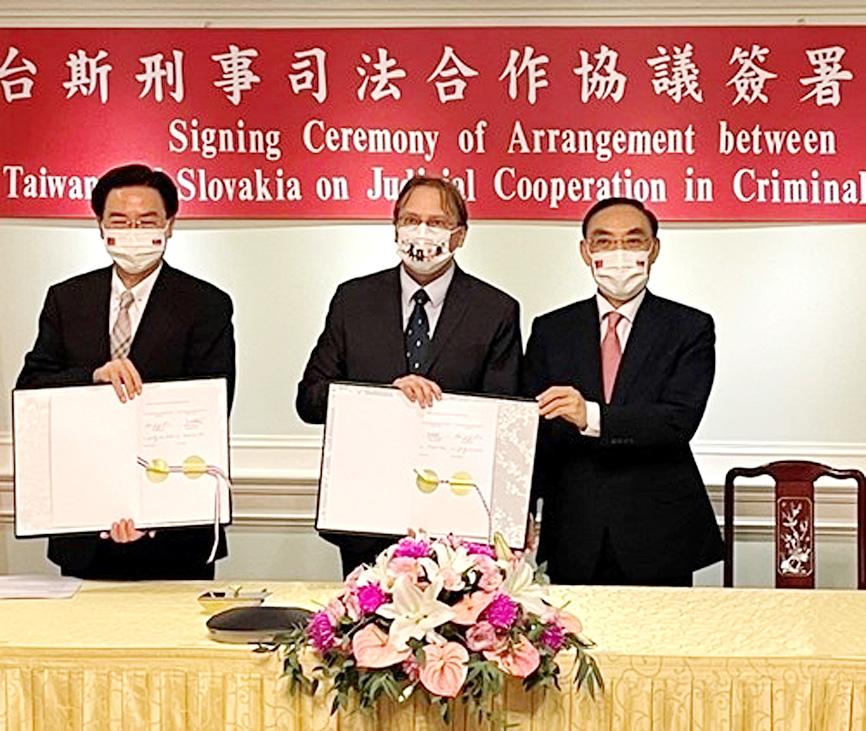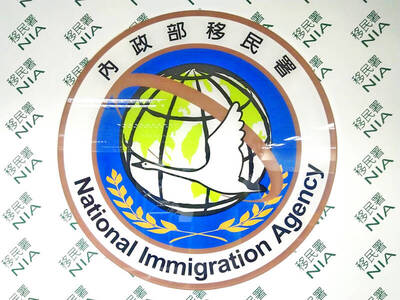Minister of Justice Tsai Ching-hsiang (蔡清祥) yesterday announced the completion of the process to extradite a Polish national back to his country, following the recent signing of a judicial cooperation agreement with Poland, while another similar pact with Slovakia was finalized on Tuesday.
Tsai and other Ministry of Justice officials said that the extradition was another successful case of judicial cooperation with a European country.
According to information from the ministry, Taiwan has made breakthroughs regarding new bilateral agreements on judicial matters, and thus far, has repatriated seven German nationals, one citizen from the UK and one from Denmark, as well as the Polish national, to serve their remaining prison terms in their home countries.

Photo copied by Wu Cheng-feng, Taipei Times
Ministry officials said it was not easy to complete the process for the latest repatriation, as the Taiwan-Poland Criminal Justice Cooperation Agreement required ratification from both sides, and only received the final approval from Polish President Andrzej Duda in January.
Prosecutor Lin Ming-yi (林明誼), who handled the case, told reporters that the Polish national was found guilty in a criminal case and was serving his term in a local prison.
“He did not have much to complain about regarding the prison conditions, as he was placed in a renovated facility specifically for foreign nationals,” Lin said, “The problem was that he does not speak much English, and was unable to communicate with other people. So he kept on expressing his wish to serve the remainder of his prison term back home in Poland.”
Lin said the judiciary made detailed arrangements to facilitate the extradition.
Due to the COVID-19 pandemic, he and other ministry officials could not visit Poland, so they had to communicate via e-mail, Lin said.
The process and discussions helped the Polish government better understand that Taiwan has a good justice system, that both sides can trust each other and can deliver on the promises made, he said.
“It was not easy to make arrangements, because Taiwan in May had a surge in local [COVID-19] infections. It was our job to ensure that all prevention measures and safety guidelines had been followed,” Lin said.
Poland’s judiciary sent three police officers to Taiwan, who had to present negative COVID-19 tests from within three days of boarding their flight, he said.
The ministry fast-tracked their clearance at the airport, provided designated vehicles and drivers, and accommodated them at a quarantine hotel, Lin said, adding that they held meetings with Ministry of Foreign Affairs officials and Poland’s representative office, at which disease prevention measures were strictly adhered to.
Personnel from the Investigation Bureau delivered the Polish national to Taiwan Taoyuan International Airport, and officially handed him over to the three Polish police officers on May 17, as they boarded a flight to Poland, he said.
Earlier on Tuesday, Tsai was joined by Minister of Foreign Affairs Joseph Wu (吳釗燮) and Slovak Economic and Cultural Office in Taipei Representative Martin Podstavek to announce the signing of the Arrangement between Taiwan and Slovakia on Judicial Cooperation in Criminal Matters — the nation’s sixth such mutual legal assistance pact with a European country.
The agreement took four years to complete.

A magnitude 5.7 earthquake struck off Taitung County at 1:09pm today, the Central Weather Administration (CWA) said. The hypocenter was 53km northeast of Taitung County Hall at a depth of 12.5km, CWA data showed. The intensity of the quake, which gauges the actual effect of a seismic event, measured 4 in Taitung County and Hualien County on Taiwan's seven-tier intensity scale, the data showed. The quake had an intensity of 3 in Nantou County, Chiayi County, Yunlin County, Kaohsiung and Tainan, the data showed. There were no immediate reports of damage following the quake.

A BETRAYAL? It is none of the ministry’s business if those entertainers love China, but ‘you cannot agree to wipe out your own country,’ the MAC minister said Taiwanese entertainers in China would have their Taiwanese citizenship revoked if they are holding Chinese citizenship, Mainland Affairs Council (MAC) Minister Chiu Chui-cheng (邱垂正) said. Several Taiwanese entertainers, including Patty Hou (侯佩岑) and Ouyang Nana (歐陽娜娜), earlier this month on their Weibo (微博) accounts shared a picture saying that Taiwan would be “returned” to China, with tags such as “Taiwan, Province of China” or “Adhere to the ‘one China’ principle.” The MAC would investigate whether those Taiwanese entertainers have Chinese IDs and added that it would revoke their Taiwanese citizenship if they did, Chiu told the Chinese-language Liberty Times (sister paper

The Chinese wife of a Taiwanese, surnamed Liu (劉), who openly advocated for China’s use of force against Taiwan, would be forcibly deported according to the law if she has not left Taiwan by Friday, National Immigration Agency (NIA) officials said yesterday. Liu, an influencer better known by her online channel name Yaya in Taiwan (亞亞在台灣), obtained permanent residency via marriage to a Taiwanese. She has been reported for allegedly repeatedly espousing pro-unification comments on her YouTube and TikTok channels, including comments supporting China’s unification with Taiwan by force and the Chinese government’s stance that “Taiwan is an inseparable part of China.” Liu

MINOR DISRUPTION: The outage affected check-in and security screening, while passport control was done manually and runway operations continued unaffected The main departure hall and other parts of Terminal 2 at Taiwan Taoyuan International Airport lost power on Tuesday, causing confusion among passengers before electricity was fully restored more than an hour later. The outage, the cause of which is still being investigated, began at about midday and affected parts of Terminal 2, including the check-in gates, the security screening area and some duty-free shops. Parts of the terminal immediately activated backup power sources, while others remained dark until power was restored in some of the affected areas starting at 12:23pm. Power was fully restored at 1:13pm. Taoyuan International Airport Corp said in a